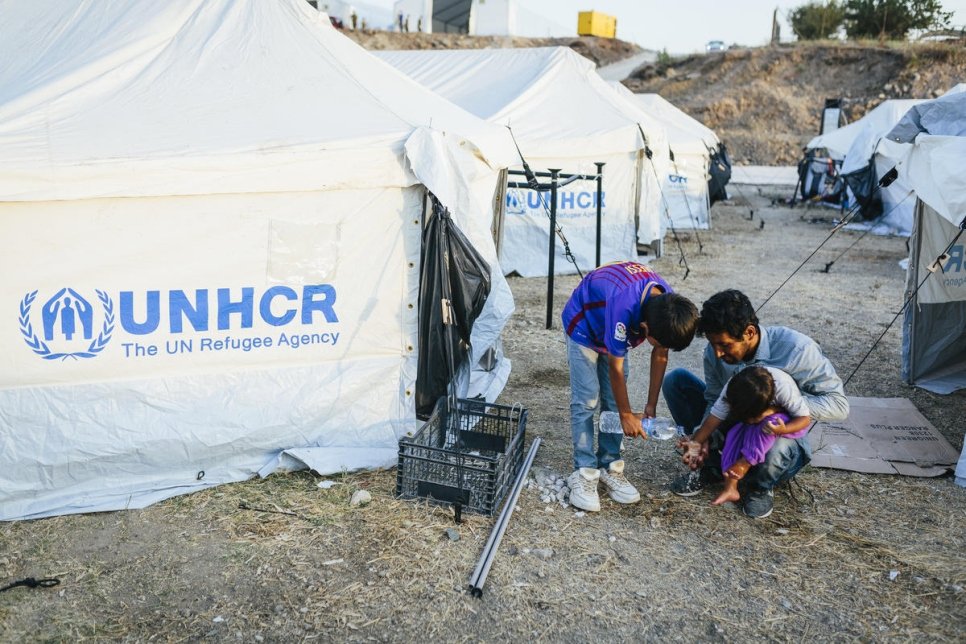Ελληνικά UNHCR, the UN Refugee Agency, is calling for urgent action to improve conditions and ensure humane solutions for asylum seekers in reception centres in the Aegean islands, including in the new emergency site on Lesvos. In the aftermath of the series of blazes that devastated the Moria Reception and […]

An Afghan asylum-seeker helps his father wash the hands of his younger brother at the Kara Tepe emergency site on Lesvos, Greece.
UNHCR, the UN Refugee Agency, is calling for urgent action to improve conditions and ensure humane solutions for asylum seekers in reception centres in the Aegean islands, including in the new emergency site on Lesvos.
In the aftermath of the series of blazes that devastated the Moria Reception and Identification Centre on Lesvos and forced some 12,000 men, women and children on to the streets, the Government of Greece has swiftly mobilized the Hellenic Army and humanitarian partners to establish an emergency facility to shelter those made homeless. Some 9,400 asylum seekers left homeless by the fire are now residing in this government-run site, which was set-up in a matter of days. Several hundred of most vulnerable have been transferred to safe accommodations on the island or relocated to the mainland.
All partners involved in the refugee response on Lesvos, including national and local non-governmental organizations have been working around the clock to ensure that all asylum-seekers and refugees received immediate assistance, shelter and core relief items.
UNHCR, however, emphasizes the urgent need for adequate solutions for asylum-seekers, who have been living in unacceptable conditions on the Aegean islands for far too long.
“The events in Moria are a wake-up call of the long-standing need to address the precarious situation for thousands of people in the islands and to accelerate their safe and orderly transfer to more appropriate accommodation on mainland”, said UNHCR Representative in Greece, Philippe Leclerc.
“What is crucial is comprehensive response, going beyond short-term fixes. This means ensuring adequate reception conditions, access to fair and fast asylum procedures, integration opportunities for those granted asylum and swift returns for those not in need of international protection. Unless all elements of the response are adequately and promptly addressed, we will see more Morias emerging.”
UNHCR welcomes the progress made on ongoing transfers of unaccompanied children from the Aegean islands to the mainland, as well as the commitment of Greek authorities, to transfer, as soon as possible, recognized refugees and asylum-seekers who are already authorized to leave the islands.
UNHCR estimates that there are at least 4,000 people on all islands, including almost 2,000 on Lesvos, who are eligible to be transferred to the mainland immediately. Their transfer will be a significant step in decongesting reception facilities on the islands.
Asylum processes must resume on Lesvos, with all necessary procedural safeguards, to facilitate the prompt and orderly transfers of others from the island as well.
To support decongestion efforts and expedite transfers, reception capacity on the mainland needs to be boosted. UNHCR is appealing to Greek authorities to increase accommodation places on the mainland with the support of the European Commission.
UNHCR is also calling on European states to continue their support to Greece through the offering of relocation places for the most vulnerable asylum-seekers and recognized refugees. Equally, policies and measures to facilitate the longer-term integration and self-reliance of recognized refugees in Greece are a priority.
In Lesvos, national authorities, with support from UNHCR and other humanitarian actors, are working to improve conditions in the new emergency site, addressing gaps in health, water, sanitation and hygiene facilities.
With COVID-screening continuing for all entrants to the new site, there are some 250 people who have tested positive for COVID-19 as of 24 September. According to national health authorities, all are placed in quarantine alongside their family members. Sustained and adequate medical care as well as access to sufficient water, sanitation and hygiene facilities are therefore even more critical.
To address the onset of cooler weather conditions, UNHCR is planning to provide insulation kits and wooden pallets for the families sheltering in tents as an interim measure.
UNHCR stands ready to continue supporting Greece in this complex yet manageable situation.
UNHCR’s calls follow the release of the European Commission’s Pact on Migration and Asylum, which contains a series of legislative proposals on the EU’s approach to migration and asylum. UNHCR, along with our sister agency IOM, has called for a truly common and principled approach to European migration and asylum policies. With relatively few new arrivals of refugees and migrants to Europe, the situation is manageable. Now is the time for EU states to move away from a crisis-response and ad hoc approach to a comprehensive, well-managed and predictable one to address mixed movements, both within and beyond the EU.
For more information on this topic, please contact:
Μοιράσου το στο Facebook Μοιράσου το στο Twitter